Articles
Japan - Korea
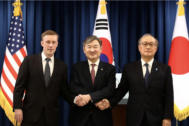
Japan - Korea
September — December 2023The Year 2023—Major Turning Point and Blossoming Cooperation
The year 2023 was a turning point for Japan-South Korea relations. There was a breakthrough in the issue of compensating forced laborers, which led South Korean President Yoon Suk Yeol and Japanese Prime Minister Kishida Fumio to meet seven times since their summit in March. Shuttle diplomacy has been fully resumed. By year’s end, their cooperation in new areas such as energy, critical and emerging technology, development and humanitarian assistance, space, and cyber is blossoming. Last year will be remembered as the year that began to demonstrate a real potential for Seoul and Tokyo to be like-minded global partners, along with Washington. If the first half of 2023 was a speed chase to get to the finish line—the Camp David trilateral summit meeting—the latter half of 2023 was a coordinated plan to prepare for many more races. As noted in our last issue of Comparative Connections, the Camp David trilateral summit represented a potential harbinger for the future of Japan-Korea relations.

Japan - Korea
May — August 2023Camp David: Institutionalizing Cooperation Trilaterally
Japan-South Korea relations are going strong. In the months leading up to the historic Camp David trilateral summit in August, we saw the return of shuttle diplomacy between Korea and Japan. If President Yoon Suk Yeol’s March visit to Japan was groundbreaking, Prime Minister Kishida Fumio’s May visit to Seoul signified the continued momentum of improving bilateral ties. The Aug. 18 trilateral summit meeting, where President Biden, President Yoon, and Prime Minister Kishida announced bold steps to cement trilateral cooperation into the institutional fabric of the relationship, represents the deepest attempt in recent memory. A successful trilateral summit like this one was possible only because Seoul and Tokyo mended their bilateral ties. A positive cycle is expected the other way around, as well. For example, the “Commitment to Consult” —to expeditiously “share information, align messaging and coordinate response actions” among the three leaders—will likely create more incentives and opportunities for Seoul and Tokyo to keep bilateral relations friendly and cooperative.
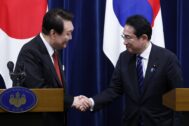
Japan - Korea
January — April 2023The Return of Shuttle Diplomacy
In March 2023, Japan and South Korea had a long-awaited breakthrough in their bilateral relations, which many viewed as being at the lowest point since the 1965 normalization. On March 16, South Korean President Yoon Suk Yeol and Japanese Prime Minister Kishida Fumio held a summit in Tokyo and agreed to resume “shuttle diplomacy,” a crucial mechanism of bilateral cooperation that had been halted for about a decade. Behind the positive developments was President Yoon’s political decision on the issue of compensating wartime forced laborers. The two leaders took steps to bring ties back to the level that existed prior to actions in 2018 and 2019, which precipitated the downward spiral in their relationship. Japan decided to lift the export controls it placed on its neighbor following the South Korean Supreme Court ruling on forced labor in 2018. South Korea withdrew its complaint with the World Trade Organization on Japan’s export controls. Less than a week after the summit, Seoul officially fully restored the information sharing agreement (GSOMIA) that it had with Tokyo. They also resumed high-level bilateral foreign and security dialogues to discuss ways to navigate the changing international environment together as partners.
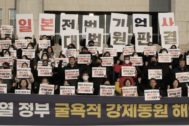
Japan - Korea
September — December 2022Japan and South Korea as Like-Minded Partners in the Indo-Pacific
The last four months of 2022 saw a flurry of bilateral diplomatic activities between Japan and South Korea in both nations’ capitals and around the world. They focused on 1) North Korea, 2) the issue of wartime forced labor, and 3) the future of Seoul-Tokyo cooperation in the Indo-Pacific region. Despite mutual mistrust and the low approval ratings of Prime Minister Kishida Fumio and President Yoon Suk Yeol, both leaders had the political will to see a breakthrough in bilateral relations. Another signal came in the form of new strategy documents in which Seoul and Tokyo explained their foreign and security policy directions and goals. On Dec. 16, the Kishida government published three national security-related documents—the National Security Strategy (NSS), the National Defense Strategy (NDS), and the Defense Buildup program. On Dec. 28, the Yoon government unveiled South Korea’s Strategy for a Free, Peaceful, Prosperous Indo-Pacific Region, its first-ever Indo-Pacific strategy. Although each document serves a somewhat different purpose, it is now possible to gauge how similarly or differently Japan and South Korea assess challenges in the international security environment, and how they plan to respond to them.
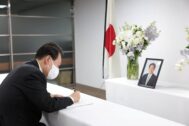
Japan - Korea
May — August 2022The Passing of Abe and Japan-Korea Relations
How might the passing of former Prime Minister Abe Shinzo impact Tokyo’s approach to Seoul? This unexpected turn of events loomed large in the minds of many who have been cautiously optimistic that Japan and South Korea would take steps toward a breakthrough in their stalled relations. In our last issue, we discussed how this summer could provide good timing for Seoul and Tokyo to create momentum in this direction after Yoon Suk Yeol’s inauguration as president in South Korea and the Upper House election in Japan. However, the results from this summer were mixed. Seoul and Tokyo have not yet announced whether Yoon and Kishida will hold a summit any time soon. Both leaders ended the summer juggling domestic politics amid declining approval ratings. However, there were some meaningful exchanges between the two governments, signaling that both sides were interested in improving relations.

Japan - Korea
January — April 2022South Korea’s New President and a Seoul-Tokyo Reset?
What impact will the victory of Yoon Seok-yul in South Korea’s presidential elections have on Seoul-Tokyo relations? During his campaign, Yoon repeatedly emphasized the “strategic importance of normalizing” and improving relations with Japan. It was an open secret that Yoon was Tokyo’s preferred candidate. With his May inauguration, opportunities for a diplomatic reset are on the horizon. Unsurprisingly, however, Japan is responding cautiously to overtures. Prime Minister Kishida Fumio sent his foreign minister to Yoon’s inauguration on May 10, instead of attending himself, especially as he looks to the Upper House election in July. Seoul and Tokyo will probably schedule a long-awaited summit meeting when they begin to move toward addressing the issue of wartime forced laborers. That issue has strained bilateral ties since the South Korean Supreme Court ruled in favor of Korean wartime forced laborers in separate decisions in late 2018, leading to drawn-out legal processes against the court orders. Yoon’s election win has not changed the Japanese position, which maintains that the reparations issue was fully settled by the 1965 normalization treaty.

Japan - Korea
September — December 2021Awaiting a Breakthrough? PM Kishida and South Korea’s Presidential Candidates
The year 2021 ended with no breakthroughs in Japan-Korea relations. Bilateral ties remain stalled over South Korea’s 2018 Supreme Court ruling on forced labor during Japan’s occupation of the Korean Peninsula and Japan’s export restrictions placed in 2019 on key materials used for South Korea’s electronics industry. The inauguration of Kishida Fumio as Japan’s new prime minister in September did not lead to a new momentum for addressing these bilateral issues, as both Tokyo and Seoul adhered to their positions. Prime Minister Kishida, while acknowledging that Japan’s relationship with South Korea should not be left as is, largely reiterated Tokyo’s official stance from the Abe and Suga governments that Seoul should first take steps on the forced labor issue. South Korean President Moon Jae-in sent a letter congratulating Kishida on his inauguration, signaling willingness to talk about bilateral challenges. Developments in the final months of 2021 are a reminder that there is no easy solution to these issues in sight.
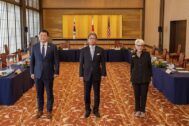
Japan - Korea
May — August 2021Unrealized Olympic Diplomacy
In the summer months of 2021, the big question for many observers was whether Prime Minister Suga Yoshihide and President Moon Jae-in would hold their first summit meeting during the Tokyo Olympic Games. Cautious hope was in the air, especially on the South Korean side. However, by the time the Olympics opened in late July, any such hope was dashed amid a series of unhelpful spats. Seoul and Tokyo decided that they would not gain much—at least not what they wanted from the other—by holding a summit this summer. With Suga’s announcement of his resignation as head of the Liberal Democratic Party (LDP) at the end of September, barring any sudden turn of events, his tenure as Japanese prime minister will be recorded as one that did not have a summit with a South Korean president.
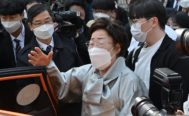
Japan - Korea
January — April 2021Difficult to Disentangle: History and Foreign Policy
Unsurprisingly, historical issues proved difficult to disentangle from other foreign policy issues in Japan-South Korea relations, which remained at the “worst level since the normalization” in the first four months of 2021. The Seoul Central District Court’s ruling on Jan. 8 that the Japanese government should pay damages to victims of sexual slavery during World War II set the tone for contentious relations at the beginning of the year. While the Moon Jae-in administration made gestures to mend ties, the Suga administration maintained that South Korea should take concrete measures to roll back the 2018 South Korean Supreme Court ruling on Japanese companies requiring them to compensate wartime forced laborers. Export restrictions levied by Japan against South Korean companies in 2019 remain in place, while the case is with the World Trade Organization after South Korea reopened a complaint in 2020 that was filed and then suspended in 2019.
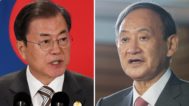
Japan - Korea
September — December 2020A New Leader in Japan and Uncertain Future Scenarios
The inauguration of Suga Yoshihide as Japan’s prime minister in September 2020 did not lead to a breakthrough in the stalled Japan-South Korea relationship. However, it provided an opportunity for South Korea to signal that President Moon Jae-in would be interested in a summit meeting with Suga. In the final months of 2020, it became apparent that both governments in Seoul and Tokyo felt the need to improve bilateral ties, but had not yet found a way to make that happen.
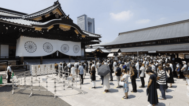
Japan - Korea
May — August 2020History, Trade, and Distrust
“Cold economics, cold politics” has become the new normal in Japan-South Korea relations. Instead of the practical stability that they maintained in the first months of this year, latent tension became the defining force as Seoul and Tokyo followed through their earlier decisions made in 2018 and 2019. The twin decisions—South Korea’s Supreme Court ruling on forced labor during Japan’s occupation of the Korean Peninsula and Japan’s export restrictions on key materials used for South Korea’s electronics industry—planted the seeds of discord and deterioration of bilateral ties during the summer months of 2020. In June, following the 2018 Supreme Court’s order, the Daegu District Court released a public notice to Nippon Steel, formerly known as Sumitomo Metal, a move to seize and liquidate the local assets of the company. In response to Japan’s imposition of export controls in 2019, South Korea filed a complaint with the World Trade Organization. This downward spiral will likely continue for the remainder of the year unless South Korea and Japan take decisive action to address these disputes. On the North Korea front, Japan’s newly published Defense of Japan 2020 assessed North Korea’s nuclear and missile capabilities as posing greater threats to Japanese national security than previous years.
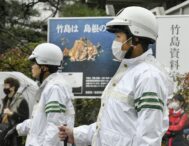
Japan - Korea
January — May 2020Pragmatic Stability, Latent Tensions
In the first months of 2020, Japan and South Korea maintained pragmatic stability despite a brief flare-up over travel restrictions. The need to prioritize recovery from COVID-19 weighed heavily in favor of both countries seeking to focus on domestic issues. With the landslide victory of the ruling Democratic Party in the April parliamentary elections in South Korea, it is not likely that Seoul’s approach to the bilateral disputes with Tokyo will undergo a fundamental change anytime soon. With the US presidential election now six months away, continuing stalemate in US-South Korea military cost-sharing talks and volatility surrounding North Korea form an important backdrop to uncertainties in the South Korea-Japan bilateral relationship. By September, we may know whether it is pragmatic stability or latent tension that is the defining force in South Korea-Japan relations in 2020.
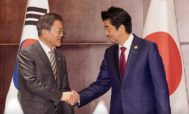
Japan - Korea
September — December 2019Thaws and Tremors
If relations between Japan and South Korea were defined by “cold economics, cold politics” through the summer of 2019 (as we described it in the September issue of Comparative Connections), South Korea-Japan ties at the end of 2019 had begun a tentative thaw. Tensions between the two countries have fallen in the waning months of 2019 from their peak in the summer, when Japan imposed export restrictions on South Korea and Seoul Korea indicated its intent to withdraw from the General Security of Military Information Sharing Agreement (GSOMIA). Following a comparatively quiet but tense period in September and October, both countries took de-escalatory steps starting in November—most notably South Korea’s conditional decision not to withdraw from GSOMIA after all—that improved the atmosphere and created space for diplomacy.
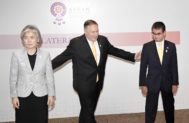
Japan - Korea
May — August 2019Cold Economics, Cold Politics
It is hard to find anything truly unprecedented in a South Korea-Japan relationship that has long seen periods of elevated tension. That is what makes the recent escalation of disputes into the economic relationship a moment of outsize significance in the history of the relationship. As recently as the last update for Comparative Connections in May, we concluded that “South Korea-Japan economic and trade relations have remained … largely unrelated to political developments and driven by practical considerations.” That assessment reflected the fact that, however high the political tensions, there have been two unwritten red lines: first, allowing political tensions to harm existing, mutually beneficial security cooperation for deterring North Korean provocations, especially when working jointly with the US; second, bringing those tensions into the economic relationship. Over the last four months, those red lines have been blurred in a series of escalating retaliatory moves with direct consequences for both countries and the regional economic and security order as a whole.

Japan - Korea
January — April 2019Hitting an All-Time Low
In the early months of 2019, Japan-South Korea relations have continued a downward spiral. In their dealings with the radar lock-on dispute and a South Korean court ruling on forced laborers, both Seoul and Tokyo responded to the other’s action negatively, reaching the point of suspending all senior-level defense exchanges for the first half of the year. While recent developments may point to yet another period of all-time low in Seoul-Tokyo relations, it is possible that the year 2019 may signify the beginning of a new trend at a deeper level. That is, Seoul and Tokyo do not regard the other as a valued partner in their long-term national security strategy, even when addressing nuclear and missile threats from North Korea. On the Japan-North Korea front, once the biggest regional champion of the US “maximum pressure” campaign, Japan has continued to reckon with the region’s sudden turn toward diplomacy with North Korea and made some policy adjustments for better alliance coordination with the United States.
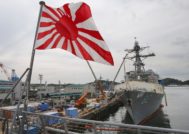
Japan - Korea
September — December 2018Unfortunate Circumstances and Escalating Tensions
Fall 2018 represented a turning point in Japan-South Korea ties as an uneasy truce between the two countries gave way to escalating tensions. South Korea’s Supreme Court ruled that two Japanese companies must compensate 10 South Koreans forced into labor during Japan’s occupation of the Korean Peninsula from 1910 to 1945. South Korea’s decision to dissolve the foundation built to implement the 2015 “comfort women” agreement between Seoul and Tokyo, though not unexpected, also added to the general atmosphere of growing tension. As 2018 came to a close, tensions flared as Japan alleged a South Korean Navy destroyer locked onto a Japanese Maritime Self-Defense Force plane with a radar used for targeting weapons – a claim Seoul vigorously denies. On the Japan-North Korea front, Prime Minister Abe’s willingness to meet Kim Jong Un characterized Tokyo’s response to the Trump-Kim summit amid increasing uncertainty concerning Japan’s role in talks on denuclearization of North Korea, but with no real change of Japan’s North Korea policy.
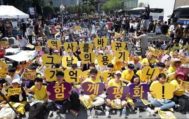
Japan - Korea
May — August 2018Back to Normal Business
Korea-Japan relations returned to normal over the summer months as Pyongyang-Tokyo relations remained at a standstill and Seoul-Tokyo relations followed the dual track approach. For both Pyongyang and Seoul, the primary demand is for Japan to offer an acceptable apology and compensation for Japan’s actions during its colonial rule of the Korean Peninsula. Pyongyang demanded atonement for Japan “war crimes” as the basic condition for the resumption of dialogue between the two countries. Seoul urged Japan to sincerely apologize to Korean women forced into wartime sexual slavery, saying that the issue cannot be resolved diplomatically. Other sources of contention for North Korea-Japan relations are Japan’s support for UN sanctions against the DPRK and Pyongyang’s unwillingness to account for past abductions of Japanese citizens. In the case of South Korea-Japan relations, the disputes over Dokdo/Takeshima and biased history textbooks lingered, although both sides made efforts to strengthen economic, security, and cultural ties despite those issues.
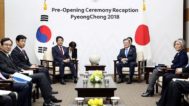
Japan - Korea
January — April 2018The North Korea Factor
In the first four months of 2018, Japan’s relationship with South Korea was influenced more than ever by North Korea as a thaw in inter-Korean relations created a new dynamic for Japan-Korea relations. The shift began with Kim Jong Un’s expressed hope for improvement in Seoul-Pyongyang relations and inter-Korean talks in his 2018 New Year’s speech. The PyeongChang Winter Olympics created significant momentum and the inter-Korean summit in late April put an exclamation mark on the dramatic turnabout. While Moon Jae-in’s administration welcomed the initiative from the North with guarded optimism and facilitated the improvement in relations as the gracious host for both the Olympics and the summit, the Abe administration kept a skeptical and indeed critical stance toward North Korea’s “charm offensive.” However, Japan was forced to move away from its hardline policy in the face of inter-Korean bonhomie and when the US recognized the shift as an opportunity to move toward diplomacy with North Korea.
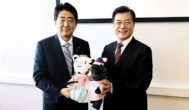
Japan - Korea
September — December 2017Continuation of Dual Track Approach
In the final four months of 2017, South Korea-Japan relations continued on the same trajectories as they had over the summer – both countries adopted a dual-track approach to bilateral relations. While controversy over the comfort women issue and Dokdo/Takeshima continued with numbing predictability, Seoul and Tokyo moved forward in developing what they called a “future-oriented relationship” centered on economics and North Korea. While officials on both sides regularly expressed hopes for reviving high-level shuttle diplomacy, the most significant element of the past few months has been how directly Washington was influenced by, but also influenced, Seoul-Tokyo relations. Although it has been an important element in Korea-Japan relations since the end of the Pacific War, recent events have demonstrated the importance of the triangular relationship.

Japan - Korea
May — August 2017On Board for a Dual Track Approach
With the inauguration of Moon Jae-in in South Korea on May 10, relations between Seoul and Tokyo witnessed a significant turnaround over the summer months of 2017. In particular, the dispute over the “comfort women” agreement reached in 2015 escalated as the Moon administration reversed course, launching a task force on July 31 to review the agreement. Meanwhile, concerns that measures the Park administration had adopted to improve security ties with Japan might be revoked were dispelled when Seoul and Tokyo agreed to maintain close security cooperation on the North Korea issue. In addition, despite the continued tension over Dokdo/Takeshima and Japan’s wartime crimes, Seoul and Tokyo chose to “pursue forward-looking relations” through diplomatic exchanges. Given that the Moon administration has indicated that it wants relations to go smoothly regardless of the comfort women issue, we expect diplomatic exchanges and security cooperation to continue. Sustained improvement will depend on South Korea’s “final” decision on the 2015 comfort women agreement.

Japan - Korea
January — April 2017Running on Rivalry: Presidential Hopefuls Capitalize on Disputes
With South Korean presidential election scheduled for May 9, the early months of 2017 witnessed not only avid campaigning by candidates, but also a deepening diplomatic conflict between Seoul and Tokyo. In particular, the installation of a “comfort woman” statue facing the Consulate General of Japan in Busan last December perturbed bilateral relations, calling into question the landmark “comfort women” agreement. While the anticipated installations of additional statues by provincial and civic actors risked escalating tensions further, the presidential candidates have made nominal efforts to quell the concerns of Japanese diplomats. As the Blue House prepares to greet its new occupant, prospects for a significant turnaround in bilateral relations remain uncertain.
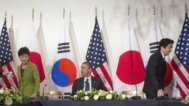
Japan - Korea
September — December 2016What Goes Up, Must Come Down
Going into the final months of 2016, Seoul-Tokyo relations had been on a positive trajectory, creating that ill feeling that it was time for things to go awry. While the relatively calm period witnessed palpable results with the signing of the General Security of Military Information Agreement (GSOMIA) and solidarity against North Korea’s provocations, the political chaos in South Korea that climaxed with the impeachment of President Park Geun-hye in December put the brakes on further developments. The scandals surrounding the abuse of power involving a shadowy confidante made it difficult to shake off the feeling that the administration’s deals with Japan have become tainted. Now, South Korean presidential hopefuls are tapping into public discontent to undermine the “comfort women” deal reached in December 2015, and there is high skepticism in the media over the implementation of GSOMIA.
The summer months were less tumultuous than usual for Seoul and Tokyo. Aside from the main political issue surrounding the implementation of the “comfort women” deal that was struck back in December 2015, there were many visible instances of cooperation across a range of sectors. To some extent, Seoul was preoccupied with the fallout from its decision to host the Terminal High Altitude Area Defense (THAAD) system while Japan was focused on its House of Councillors election in July. It was business as usual with North Korea for Japan, with efforts to denounce Pyongyang’s ballistic missile tests and the stalemate over the investigation into the abduction of Japanese citizens since the North’s decision to suspend the probe in February 2016.
Japan - Korea
January — April 2016Mostly Sanctions, Some Commerce, and Elections
The beginning of a new year offers an opportunity to evaluate how circumstances change. While the first few months of 2015 conveyed (cautious) optimism amidst notable celebrations like the anniversary of the restoration of diplomatic relations between Japan and South Korea and the 70th anniversary of the end of World War II, there was no focal point in early 2016 to push the momentum toward greater cooperation for Seoul and Tokyo. The main difference to the start of this year was the dominance of the Japan-North Korea dyad. Perhaps the Jan. 6 nuclear test by Pyongyang was a foreshadowing of things to come, as relations with Tokyo remained rather tumultuous: several missile tests by Pyongyang combined with retributive actions on the part of Tokyo made progress on the abduction issue – arguably Japan’s top priority vis-à-vis the North (alongside denuclearization) – extremely unlikely.
Japan - Korea
September — December 2015A Litigious Time of the Year
The overarching theme for the end of the year was litigation. The trial of Kato Tatsuya (former Seoul bureau chief for Sankei Shimbun) led to his acquittal for criminal libel. The trial of Park Yu-ha, a professor at Sejong University charged with defamation for her 2013 book Comfort Women of the Empire began in December. The General Association of Korean Residents in Japan (Chongryon) and its affiliates faced three separate lawsuits in Japan and South Korea. A Korean was arrested and later indicted for his role in placing a bomb at Yasukuni Shrine. There were also competing interpretations of the international status of North Korean refugees in the case of contingencies. The much-awaited November Park-Abe summit was quickly tested by incidents that could easily strain relations. To the credit of Seoul and Tokyo, neither government let a single issue damage the relationship. In fact, the two ended up reaching an accord on “comfort women/sex slaves” at yearend. Despite immediate praise from the US, there was considerable frustration from both publics over the agreement.
Japan - Korea
May — August 2015Sorry Seems the Hardest Word (unless you’re a CEO)
It has become the norm for countries to at least try to avoid undermining the spirit of bilateral celebrations. The general mood enveloping both Japan and Korea – in anticipation of the 50th anniversary of normalization of relations on June 22 – was to accentuate areas where progress was being made while marginalizing issues that are predictably controversial. This translated into some compromise on Japan’s pursuit of gaining inscription for several sites on UNESCO’s World Heritage List, a few exchanges of cultural artifacts, and bilateral talks and meetings on the sidelines of major international conferences. The general mood, however, was decidedly anticlimactic as the 70th anniversary of Korea’s independence from Japanese colonial rule or the defeat by Japan in World War II were not so much an occasion to celebrate how much each country had accomplished, but a reality check on how much the two had yet to achieve. This “glass half empty” sentiment prevented any one event to stand out as a hallmark of bilateral cooperation over the summer.
Japan - Korea
January — April 2015The Art of Politics and the Politics of Art
At the end of 2014, there were both stern warnings but also cautious optimism for what 2015 held in store for Japan and South Korea in anticipation of the 50th anniversary in June of the restoration of diplomatic relations and the upcoming 70th anniversary of the end of World War II. The early months of 2015 did not bring any new explosive point of contention to the surface, but issues such as talks on comfort women/sex slaves and territorial sovereignty over Dokdo/Takeshima remained the focus of relations. The most visible manifestation came with Prime Minister Abe’s visit to the US in late April. Clearly playing to his audience, he reassured Americans but disappointed Koreans. While governments were fine-tuning their art of politics, a group of nongovernmental actors – academics, large corporations, and the art community – got swept away by the politicization of bilateral relations.
Japan - Korea
September — December 2014How (Juicy) Tabloid News Subsumed Relations
Despite continued political bickering between Japan and its neighbors, Chinese and Korean tourism to Japan reached record heights in 2014. While the increase can be partly attributed to the plunging value of the yen, it also emphasizes one fact: the people of Northeast Asia are deeply interconnected in a number of ways. It is ironic that while both Japan and South Korea use the same characters and pronunciation for both “past” and “future,” there is little to suggest a consensus on either the past or the future. Nevertheless, the process of seeking some accord dominated the relationship in the final months of 2014 as evidenced by occasional meetings and brief encounters on the sidelines of multilateral conferences. To an optimist, there was no single dispute that consumed the bilateral relationship; to a cynic, there was no observable progress resulting from the meetings.
Japan - Korea
May — August 2014The Best of Times, the Worst of Times
Relations between Japan and the two Koreas were relatively calm. The most significant events centered on domestic issues with Japan’s reconsideration of the Kono Statement being the most notable. In all, relations remained frozen. In particular, ROK-Japan political relations remained “the worst of times.” But, so far these troubles have not had a significant impact on economic relations. Meanwhile, the DPRK and Japan have made tentative moves to repair relations, which could have major consequences for regional security if sustained. While “the best of times” is an exaggeration, it is worth noting that even though there is tension in East Asia, deadly conflict is relatively rare. Disputes between other countries remain confined to the rhetorical and diplomatic spheres, and economic cooperation continues to grow.
Japan - Korea
January — April 2014Is the US a “Wingman” or “Third Wheel”?
For the last few years, it has been popular for Japan-Korea watchers to ask about the possibility of a “reset” in their relations. The best time for this may be 2015, given that it marks the 70th anniversary of Korea’s liberation from Japan and the 50th anniversary of the Treaty on Basic Relations between Japan-Republic of Korea that normalized relations. As if to refute the idea that there might be any lull before a storm, Tokyo and Seoul rang in the New Year not with bells and whistles but a promotional video for Korea’s claim to Dokdo/Takeshima that went viral on YouTube. This may have set the tone for the months that followed. A major theme for the early months of 2014 was the role of the US – both as a setting and an actor – in issues ranging from the naming of the East Sea/Sea of Japan to getting the two heads of state in the same room.
Japan - Korea
September — December 2013More Naughty than Nice
The last four months of 2013 were uneventful for Korea-Japan relations. That is, simmering disputes continued to simmer and both sides made moves that annoyed the other, but there was almost no substantive action. Significantly, South Korean President Park Geun-hye continued to refuse to meet Japanese Prime Minister Abe Shinzo, and even some meetings between lower-level officials were called off. The biggest events were domestic issues that had implications for relations among the countries: the execution of Jang Song Thaek in North Korea and the release of the new National Security Strategy in Japan being the most notable. In all, relations remained frozen, with little evidence that 2014 would see any major changes in either attitudes or relations among Japan, South Korea, and North Korea.
Japan - Korea
May — August 2013No Signs of Improvement over the Summer
South Korea-Japan relations have been frozen for some time and despite the summer heat, no thaw appears likely anytime soon. Although economic interactions continue to deepen between the two countries, and although there is a clear desire – and even a need – to coordinate policies toward North Korea and China, the two countries appear more focused on other issues as their main foreign policy priorities in the short-term. The two recently elected leaders have yet to meet for a summit, a sign that even a symbolic attempt to repair relations is proving difficult. Japanese Prime Minister Abe has grown stronger with a rousing Liberal Democratic Party victory in Upper House elections, yet a number of rhetorical controversies kept attention focused on Abe’s foreign policy, particularly toward Korea and China. To date not much has changed and there is little evidence that either Seoul or Tokyo desires improved relations.
Japan - Korea
January — April 2013Groundhog Day in Foreign Policy
In the movie “Groundhog Day,” Bill Murray is fated to repeat one day of his life over and over – that description is apt for relations between Korea and Japan. North Korea’s histrionics again dominated media headlines and managed to overshadow the inauguration of Park Geun-hye in February 2013, even while South Korea and Japan under-reacted to the bluster. With Park’s inauguration, new leaders have taken office in every country in Northeast Asia, including North Korea and China, over the past 18 months. Despite new leadership, the issues remain very much the same: North Korean threats, increased South Korea-Japan economic interactions despite continued squabbling over historical and territorial issues, and a reminder that the US remains deeply involved in regional issues.
Japan - Korea
September — December 2012Leadership Changes and National Trajectories
Elections dominated the news in both Korea and Japan. South Koreans elected the first female head of state in modern Northeast Asian history and Japanese voters overwhelmingly returned the Liberal Democratic Party (LDP) to power, giving Abe Shinzo a second run at prime minister. Unsurprisingly, both elections focused on domestic economic issues, and both Park and Abe made an effort to downplay Korea-Japan relations during their campaigns. This did not stop observers from speculating about how both would rule and in particular how Korea-Japan relations might evolve. This was particularly salient because 2012 marks a considerable cooling in relations between the ROK and Japan. Surprisingly, North Korea was not a major factor in either case. The DPRK’s December satellite launch failed to disrupt or significantly change the dynamics of either election and was met with a predictable but muted sense of outrage from the US and the countries in the region.
Japan - Korea
May — August 2012Grappling on a Hillside?
Diplomatic disputes between Korea and Japan over historical issues and territory flared yet again this summer, being by far the most serious row since the mid-2000s. With both sides focused far more on proving the others’ misdeeds than on finding some stable equilibrium, the disputes threatened to spill over and affect economic relations as well as distract leaders from focusing on a number of pressing domestic and foreign issues. We try to avoid overreactions in this forum, hence the title. Korea-Japan relations are nowhere near falling off a cliff, but without stabilizing relations, there are potential deleterious bilateral and regional effects that could result from the current disputes. There were three underlying themes that characterized and reinforced the general lack of rapport: first, the reverberations from these bilateral disputes onto third parties (US, China, and North Korea); second, the domestic sources of foreign policy (known as the “second-image” in international relations theory); and third, deliberate moves toward negative issue-linkage in stymieing diplomatic relations in the region.
Japan - Korea
January — April 2012Sisyphus
The most dramatic events affecting relations in early 2012 concerned North Korea. The power transition appears to be proceeding smoothly, although mixed signals indicate that a clear foreign policy has not yet been worked out in Pyongyang. Meanwhile, South Korea and Japan continue on their seemingly disconnected tracks. In economic relations and day-to-day issues, they continue to move closer together on issues from dealing with tax evasion to joint disaster relief planning. Yet, territorial claims or claims about history are a constant irritant that threaten to derail relations. Both sides seemingly wanted relations to worsen by picking fights over Dokdo/Takeshima and making claims about history. One could dismiss the squabbling as peripheral to the main relationship, but it hinders coordination and planning over important issues, diverts diplomatic attention, and remains salient for domestic politics of both sides.
Japan - Korea
September — December 2011North Korean Leadership Change Overshadows All
The last four months of 2011 were dominated by two leadership changes – the mid-December death of Kim Jong Il after 17 years as North Korea’s leader and the election of Noda Yoshihiko in September as Japan’s sixth prime minister in the last five years. Kim’s death is a watershed event that could mean changes in North Korea’s domestic and foreign policies with repercussions around the region. South Korea and Japan reacted cautiously to the news of Kim’s death and the rise of his son, Kim Jong Un, as the “Great Successor” and new leader of North Korea. Beyond this event, however, Korea-Japan relations showed little change. Early indications suggest that Noda will maintain the foreign policy direction of his predecessors. Economic relations between South Korea and Japan – and indeed between Korea, Japan, and China – continue to move slowly forward as they continue to build financial and trade relations and institutions that will facilitate greater openness and interactions. Politically, Seoul and Tokyo remain firmly stuck arguing the same issues that have aggravated relations for decades. North Korea-Japan relations also showed little change in late 2011 as both sides repeated the usual accusations and demanded they make amends, but neither showed any inclination to do so. Meanwhile, there were three main trends in relations. First, external forces drove state behavior as evidenced by the almost domino-like efforts at free trade agreements (FTA) in both South Korea and Japan. Second, there was growing recognition of the high (and seemingly insurmountable) domestic political costs associated with non-pliable issues such as the comfort women/sex slaves. Third, there was a growing realization that change could mean opportunity as embodied in the cautious desire in both Seoul and Tokyo to shape the contours of the post-Kim Jong Il landscape in North Korea.
Japan - Korea
May — August 2011Reality or Symbolism in the Relationship
South Korea and Japan are neighbors that are advanced, technologically sophisticated capitalist economies with capable and well-educated populations, and are fully consolidated liberal democracies. They share an alliance with the US, and generally view themselves as stalwart regional allies. As has been the case for many years, relations between them during the past four months were relatively stable, with increasingly deep economic relations, voluminous cultural flows, and general agreement on a strategy of isolation toward North Korea. They also share a tendency to provoke each other over their shared history and the ownership of several islets that sit between them. When this happens, the media goes into a frenzy, breathlessly reporting the latest incident. But which is reality? Do the historical disputes meaningfully affect their bilateral relations? On the one hand, yes: they could cooperate more closely on issues such as military coordination and a free-trade agreement. On the other hand, no: it’s not at all clear that historical issues are holding up cooperation and relations are deeper across a range of issues.
Unfortunately, relations between Japan and the Republic of Korea (ROK) over the summer were portrayed by the media in both countries as punctuated by that familiar spirit of: “give me ______ (insert Dokdo or Takeshima) or give me death!” But, what else was occurring while the media with its steadfast attraction to sensational stories provided immense coverage of South Korea’s denial of entry for the three Japanese lawmakers intent on visiting Ullengdo (near the contested island of Dokdo/Takeshima) at Gimpo airport in early August? Coverage of the political sparring occurred at the expense of shedding light on other issues that deserved as much attention, if not more. Although we have no clear answer as to whether the disputes are real or symbolic, we choose to focus on other events between Korea and Japan that received far less attention, but may be more meaningful in moving the relationship forward.
Japan - Korea
January — April 2011Japan’s Tragedy Overshadows Everything
The triple tragedy in Japan overshadowed all other regional events in the first four months of 2011. The earthquake, tsunami, and nuclear crisis in March riveted the world and shone a spotlight on a country that had long been seen as an economic powerhouse. The vivid images of the disaster area were a reminder that even the most developed of countries is subject to the random course of nature and caused many to wonder how the events would affect Japan and the region. As its closest neighbors, the tragedy provided opportunities for both Koreas to offer condolences and aid to Japan and led to some hope that a stronger relationship could emerge between Japan and the Korean Peninsula. However, the tragedies did not remove the difficult issues between Japan and its neighbors or fundamentally alter longstanding trends in the region. In fact, quite soon after the earthquake these old issues began reappearing. It remains to be seen whether and to what extent the Fukushima earthquake marks a new era in Japan and what effect that might have on Japanese foreign relations, but certainly in the short term the Japanese will be focused more internally than externally as they concentrate on recovery and rebuilding.
Japan - Korea
October — December 2010The New Cold War in Asia?
The year ended with heightened tensions resulting from Pyongyang’s shelling of South Korea’s Yeonpyeong Island on Nov. 23 and the subsequent show of force by South Korea, the US, and Japan. Yet, despite dueling artillery barrages and the sinking of a warship, pledges of “enormous retaliation,” in-your-face joint military exercises and urgent calls for talks, the risk of all-out war on the Korean Peninsula is less than it has been at anytime in the past four decades. North Korea didn’t blink because it had no intention of actually starting a major war. Rather than signifying a new round of escalating tension between North and South Korea, the events of the past year point to something else – a potential new cold war. The most notable response to the attack on Yeonpyeong was that a Seoul-Washington-Tokyo coalition came to the fore, standing united to condemn North Korea’s military provocations, while Beijing called for restraint and shrugged away calls to put pressure on North Korea. Within this loose but clear division, Japan-North Korea relations moved backward with Prime Minister Kan Naoto blaming the North for an “impermissible, atrocious act.” On the other hand, Japan-South Korea relations have grown closer through security cooperation in their reaction to North Korea. Tokyo’s new defense strategy places a great emphasis on defense cooperation and perhaps even a military alliance with South Korea and Australia in addition to the US to deal with China’s rising military power and the threat from Pyongyang.
Japan - Korea
July — September 2010Same Dance, Different Floor
The two highlights in Japan-Korea relations during this quarter are Prime Minister Kan Naoto’s apology to South Korea for Japan’s colonial rule, and the appointment of Kim Jong-un, as vice chairman of the Workers’ Party Central Military Commission and military general in the Korean People’s Army. While these developments hold the promise to potentially change the security landscape of Northeast Asia, Prime Minister Kan’s first full quarter in office reveals that Japan’s North Korea policy is likely to continue along the lines of previous Japanese administrations, at least for now: an unfavorable attitude coupled with hostility and inaction. Pyongyang’s attitude toward Tokyo, too, changed little and remained more or less predictable – it denounced Prime Minister Kan for apologizing only to South Korea, criticized Japan for “shamelessly” wanting a permanent seat at the UN Security Council, and demanded compensation for all of Japan’s past wrongdoings. Japan-South Korea relations appear to be moving closer, although whether Kan’s apology will truly change anything remains to be seen.
Japan - Korea
April — June 2010Cheonan Incident Overshadows Everything
The sinking of the South Korean warship on March 26 turned the second quarter into a tumultuous time for Northeast Asian diplomacy. A multinational team of investigators concluded that North Korea was responsible, bringing Seoul and Tokyo closer together in a united stand against Pyongyang, while Japan’s relations with North Korea relations declined even more than usual as they continued their “sanctioning and blaming”: Tokyo placed more sanctions on Pyongyang, and Pyongyang blamed Tokyo for being used as a US “servant.” For its part, the Democratic Party of Japan found a face-saving solution to the problem of the Futenma relocation issue, putting the matter on hold due to the threat from North Korea. At the 60th anniversary of the Korean War, the region appears largely the same as it did in 1950. Both Koreas view each other as the main enemy, US alliances are the cornerstone of Japan and South Korean foreign policies, and China (and to a lesser extent, Russia) is sympathetic to North Korea and faces strong criticism from the US and South Korea.
Japan - Korea
January — March 2010Same As It Ever Was
Korea-Japan relations have foundered over territorial and historical disputes for quite some time. Indeed, much of this quarter’s report could have been written in 2004, or perhaps even earlier. Yet, we dutifully report the Japanese government’s latest claim, the South Korean government’s latest protest against that claim, and so on, while also reporting the increasing trade, travel, and institutional relations between the two countries. Which leads to a question: how consequential are these territorial disputes? The mere fact that Japanese and Koreans think they are important enough to alter textbooks and put claims on the Foreign Ministry website makes them consequential. However, do these claims have an impact on the other military, diplomatic, or economic affairs in the region? One could make an argument that despite the sturm und drang over who owns Dokdo/Takeshima, those affairs have not yet led to different policies in other areas, and certainly nobody thinks the territorial disputes might lead to actual war. This is not the place to discuss that question in depth, but it is one of the more intriguing questions that occurs to us as we, yet again, write about the same issues.
Japan - Korea
October — December 2009Small Signs of Progress
Relations between Japan and the two Koreas were relatively uneventful in the final quarter of 2009. The new Hatoyama government quickly began to show more attention to its relations with its East Asian neighbors and hinted at a small change in priorities with respect to North Korea. South Korea and Japan said mostly all the right things, even while substantively it seemed fairly clear that they continued to have very different opinions about territorial and historical disputes. However, no real movement or dramatic changes came about during the quarter, setting the stage for 2010 – the 100th “anniversary” of Japan’s annexation of Korea.
Japan - Korea
July — September 2009Japan’s New Government: Hope and Optimism
The highlight of the third quarter was Japan’s general election on Aug. 30 and the inauguration of the Hatoyama Cabinet on Sept. 16. Despite Prime Minister Aso’s attempt during the campaign to portray the Democratic Party of Japan (DPJ)’s foreign policy as posing national security threat to Japan, the Lower House election ended a virtual half-century of Liberal Democratic Party (LDP) rule in Japan as the country faces serious economic and security challenges. Considering that Japan’s North Korea policy in the past few years made a clear turn toward pressure with an emphasis on a resolution of the abduction issue, the major question in Japan-North Korea relations is whether this will change under the new administration led by Prime Minister Hatoyama Yukio. Pyongyang expressed hopes for a breakthrough in their bilateral relations, but it does not look like we will witness any fundamental change in Japan’s North Korea policy. Japan-South Korea relations during this quarter can be summarized as guarded optimism as both sides look to elevate bilateral ties to another level of cooperation. If there is one sure sign that this shift in Japanese politics might bring positive change, it will be over the issue of the Yasukuni Shrine.
Japan - Korea
April — June 2009Pyongyang’s Belligerence Dominates
The second quarter of 2009 saw a rapid increase in tensions between North Korea and all its neighbors, and this tension dominated relations during the quarter. In rapid succession, North Korea tested a long-range intercontinental ballistic missile (which failed), a nuclear device (successfully), dared anyone to start a war with it, and then dispatched a ship suspected of carrying small arms on a route most believed destined for Myanmar. Japan led the way in responding to North Korea, introducing harsher sanctions and calling for wider international moves to punish Pyongyang. Seoul-Tokyo relations moved closer as leaders in both capitals agreed on how to react to North Korea and both leaders welcomed the Obama administration’s moves for UN sanctions.
Japan - Korea
January — March 2009Conflict with North Improves Japan-ROK Relations
The first three months of 2009 saw Japan-North Korea relations go from stalemate to hostility, as North Korea’s “satellite” launch on April 5 heightened tensions throughout Northeast Asia. As Pyongyang tried to goad its partners in the Six-Party Talks (the new Obama administration in particular) to induce more favorable terms, Tokyo took steps that may have more far-reaching implications for regional security than merely a plan to deal with the current North Korean missile crisis. Meanwhile, Tokyo and Seoul continued to focus on a practical partnership for economic cooperation and stayed on good terms. The highlight of the quarter was Prime Minister Aso’s successful two-day visit to South Korea in mid-January for a summit with President Lee Myung-bak. Although historical issues lingered as a potential factor that might challenge and disrupt this mood of détente, Japan-South Korea relations improved due in no small part to the Lee administration’s tough policy toward Pyongyang.
Japan - Korea
October — December 2008In a Holding Pattern with Hope on the Horizon
The year ended fairly quietly in Japan-Korea relations with no major events marking the last few months of 2008. Japan-North Korea relations remained stagnant and Japan-South Korea relations essentially ignored the Dokdo/Takeshima dispute, instead focusing on dealing with the widening global economic crisis. The biggest diplomatic event was the successful trilateral summit in December among China, Korea, and Japan, which may set the stage for further diplomatic movement. Whether 2009 will bring dramatic progress on these issues remains to be seen, but with new leaders in Japan and South Korea entering their first full years of rule, the continued concerns about the health of North Korea’s leader, and a new U.S. president, the new year holds the possibility for progress on at least some of these issues.
Japan - Korea
July — September 2008Who’s in Charge?
Although there was little movement in Japan’s relations with North Korea, this quarter was dominated by the news leaking out of North Korea in early September that Kim Jong-il was potentially very sick. Questions about Kim’s health, the status of his leadership in North Korea, and the future of North Korea’s leadership quickly dominated discussion. Coupled with Japanese Prime Minister Fukuda’s surprise resignation and the quick choice of Aso Taro as prime minister, Japanese foreign policy was on a brief hiatus while the new leader set his own agenda. Known as a conservative, it is expected that Aso will take a harder line toward the North – and the region more generally – than did Fukuda. But his official appointment, coming on Sept. 24, was so recent that it is too early to see how Aso plans to proceed. Thus, there was actually little substantive change in Japan’s relations with North Korea, and the quarter ended basically where it began.
In contrast, Japan-South Korean relations plunged to new lows after a promising spring in which both Fukuda and President Lee Myung-bak had pledged to move the relationship forward. The question of who owns the Dokdo/Takeshima islets once again reared its ugly head, and both sides dug in their heels, choosing to be as provocative as possible. In what was at best a tone-deaf decision in July, Tokyo released a new set of guidelines for its middle-school teachers claiming that Takeshima was irrefutably Japanese. Seeming to contradict the spirit of the just completed and highly successful summit meeting between Japan and Korea during the spring, the decision left President Lee with little choice but to respond strongly, and relations quickly cooled between the two countries.
Although it appeared at first that there was some potential for progress on the two enduring issues on the agenda of Japan-North Korea relations – the abduction issue and Pyongyang’s nuclear development program – by the end of the quarter both issues remained essentially in the same place as they had been before. The abduction issue continued to define the tone of bilateral relations, as Japan tried to ensure that progress in the Six-Party Talks was tied to its resolution. The Tokyo-Pyongyang working-level talks in mid-August, following last quarter’s agreement that Pyongyang would reinvestigate the fate of the Japanese abductees in exchange for partial lifting of the sanctions on the North, concluded with an agreement on the terms of the investigation to be completed as swiftly as the fall of 2008. But Fukuda’s resignation as prime minister led Pyongyang to notify Japan that it would wait and see how the Aso administration approaches bilateral issues before starting the reinvestigation. Despite taking a step closer toward normalizing their diplomatic relations, there was no substantive policy change in Japan toward Pyongyang and by the end of the quarter, the new Aso administration decided to extend economic sanctions against North Korea for another six months.
Japan - Korea
April — June 2008Tentative Improvement through Pragmatism
Japan’s relations with both North and South Korea improved over the past quarter. In conjunction with the North’s June declaration of its nuclear activities, there was renewed momentum in resolving the two biggest pending bilateral issues between Tokyo and Pyongyang – the North’s nuclear development program and the abduction issue. Bilateral talks resumed in mid-June after more than six months of no progress. The second quarter also marked a fresh start for Tokyo and Seoul as President Lee’s Myung-bak’s visit to Japan – the first since December 2004 by a South Korean president – marked the resumption of so-called “shuttle diplomacy.” The summit between Prime Minister Fukuda Yasuo and President Lee produced agreements on several bilateral issues, including the stalled bilateral FTA negotiations, closer coordination on policy regarding North Korea’s nuclear development program, and youth exchanges.
Japan - Korea
January — March 2008Inaction for Inaction
Despite the change in Japanese leadership from hard-liner Abe Shintaro to the more dialogue-oriented Fukuda Yasuo, this quarter’s Japan-North Korea relations were largely uneventful and produced little progress. Tokyo criticized Pyongyang for missing the year-end deadline for declaring all its nuclear programs and facilities, urging North Korea to make a “political decision” to fulfill its commitment under the Six-Party Talks agreement. Pyongyang reiterated that Japan should be excluded from the talks, and blamed Japan for the U.S. failure to remove Pyongyang from its list of state sponsors of terror. North Korea asserted that there would be no improvement in their bilateral relations as long as Japan continues to press resolution of the abduction issue on Pyongyang. By mid-March, Tokyo had decided to extend economic sanctions against Pyongyang for another six months after they expire April 13, if the current situation continues with no breakthroughs. Meanwhile, with the change in South Korean leadership from a liberal-minded Roh Moo-hyun to the more conservative Lee Myung-bak, Tokyo exerted diplomatic efforts to bring South Korea closer to Japan by trying to form a united front between Japan, South Korea, and the U.S. against North Korea.
Japan - Korea
October 2017 — December 2007Lost in the Six-Party Talks
The final quarter of 2007 was eventful and left observers in both Japan and South Korea cautiously optimistic about bilateral relations. Both Japan and South Korea chose new chief executives this fall, and both of them promised to search for more collaboration and to begin repairing relations between the two countries. Halting progress on North Korean denuclearization through the Six-Party Talks led to hope that momentum could be sustained, although Japan for the time being has chosen to be supportive but skeptical of North Korea’s promise to denuclearize, and continued its sanctions against the DPRK. Indeed, North Korea’s missed deadline for declaring its nuclear programs was a reminder that progress in relations with North Korea is never straightforward or easy. Although no country has decided to forego the process, it is unclear how relations between North Korea and other states in the region will evolve in 2008.
Japan - Korea
July — September 2007With a New Japanese Leader, New Opportunities?
If the previous quarter was marked with little movement in the stalemate between Tokyo and Pyongyang, this quarter appears to be transitional. North Korea shut down the Yongbyon nuclear reactor and announced its intention to disable other nuclear facilities by the year’s end. In Japan – Abe Shinzo who gained national popularity for his hardline approach to North Korea – stepped down in September, and Japan’s new Prime Minister Fukuda Yasuo has hinted at softening Japan’s stance toward the North. Arguably, the quarter’s developments signaled that the pendulum of Japanese foreign policy may swing back closer toward dialogue with Pyongyang.
Abe’s decision not to visit Yasukuni Shrine on Aug. 15 was welcomed by Seoul, keeping bilateral relations relatively cool compared to the wars of words that had occurred under Koizumi. History issues continued to linger between Japan and South Korea, as Seoul made noises about Japan’s “lack of repentance” on its 62nd Liberation Day and the two countries continued to clash over the naming of the Sea of Japan/East Sea and over Japan’s 2007 Defense White Paper’s inclusion of the Dokdo/Takeshima islets as part of Japanese territory. But the quarter also witnessed important efforts aimed at strengthening bilateral cooperation. Tokyo and Seoul agreed to conduct joint surveys on the level of radiation in waters near the Dokdo/Takeshima islets and on daylight savings time policies. South Korea seemed reasonably happy with Fukuda as Japan’s new prime minister, as he said early on that he would seek more friendly relations with China and South Korea and not visit Yasukuni Shrine. Tokyo expressed concerns over the timing of the inter-Korean summit, watchful of its possible impact on the December presidential election in South Korea, and of one-sided payoffs from Seoul to Pyongyang.
Japan - Korea
January — March 2007The Honeymoon’s Over
The first quarter of 2007 saw new developments in the Japan-Korea relationship, while some very old issues resurfaced. Prime Minister Abe’s honeymoon appears to be over in both domestic politics and Japan’s foreign relations, while South Korean President Roh Moo-hyun is a lame duck with the next presidential election coming this December. The Six-Party Talks experienced unexpected and dramatic progress as a result of U.S. and North Korean initiatives, with a potential resolution appearing on the horizon. Japan’s unyielding insistence on making resolution of the abductions issue the center of its relations with North Korea threatened to isolate Japan even further as the six-party process continued.
Abe further heightened regional suspicions about Japan’s intentions when he seemed to cast doubt on both the Japanese government’s role in the World War II “comfort women” brothels and its 1993 apology, by questioning whether coercion was involved and whether the military and government were directly involved. This led to predictable outrage in South and North Korea, although South Korea’s responses were more muted than in the past. Even Australian Prime Minister John Howard told Abe that Japan should “stop quibbling” over the details of the women who were pressed into sexual service during World War II. Given Japan’s new emphasis on human rights and “value-oriented diplomacy,” as well as its insistence on resolving the abduction issue, Abe’s comments led to concerns about Japan’s new foreign policy direction.
Despite the political tensions between Japan and the Koreas, economic relations between South Korea and Japan continued their slow integration, and at the working levels, the two governments continued to find new areas of cooperation. So far, Abe has not fully defined his stance toward the two Koreas, and the coming quarter promises to be an eventful one.
Japan - Korea
October — December 2006Abe’s Ascension
With Abe Shinzo becoming prime minister of Japan in late September, Japan-Korea relations entered a new period. Political relations with both North and South Korea deteriorated badly under Prime Minister Koizumi Junichiro, and both Koreas waited to see whether Abe would take a new course toward the peninsula. His initial act of visiting South Korea and China won cautious praise from the South Koreans, although the real test of his leadership and where he plans to take Japanese foreign policy remain to be revealed. With North Korea’s nuclear test, Japan became one of the most eager participants in implementing UN Security Council Resolution 1718, although this was widely expected and thus did not unduly affect relations with South Korea. North Korea’s nuclear test marks a new phase in Northeast Asian politics, and how Japan and the two Koreas manage their relations in the coming year could have a major impact on stability in the region.
Japan - Korea
July — September 2006Missiles and Prime Ministers May Mark a Turning Point
As a tumultuous summer drew to a close, North Korea’s missile launches in July and the election of Abe Shinzo as prime minister of Japan in September may have marked the beginning of a new chapter in Northeast Asian regional relations. Although neither by itself has clearly redefined Japan-Korea relations, both events are widely seen to presage a new series of options and possibilities in the region. The missile launches in early July marked the escalation of the North Korean issue to new heights, prompting a stern response even from countries such as China and South Korea, the end result being a UN resolution that could open the door to economic sanctions against the North.
As for Abe’s election, former Prime Minister Koizumi was widely considered to have been a revolutionary Japanese politician, and whether Abe will continue along the same path as Koizumi remains to be seen. Certainly Abe, as both the youngest prime minister in the postwar era and the first one born after World War II, appears to have the potential to continue Koizumi’s reformist path. How Japan under Abe might deal with both North and South Korea has been the source of tremendous speculation, and while there are a number of predictions, it remains to be seen how and in what manner Abe’s foreign policy will develop. Some speculate that Abe will be even more assertive toward the Koreas than was Koizumi. Others wonder whether Koizumi might have been the exception, and whether Abe will revert to the norm of previous prime ministers remarkable mainly for their blandness and conventionality.
Japan - Korea
April — June 2006More Squabbling, Little Progress
Japan-Korea relations continued to be tense during the quarter. North Korea and Japan faced off over abductees, history, and the North’s presumed preparations for a missile launch. South Korea and Japan came close to a skirmish over the disputed Dokdo/Takeshima islands, and only intensive negotiations avoided a crisis between the two countries. With Japan and both Koreas seemingly locked into their respective foreign policy approaches, it is no surprise that there was little progress and much squabbling.
Japan - Korea
January — March 2006Seirei Ketsuzetsu (Cold Politics, Warm Economics)
The first quarter of 2006 produced no real movement in Japan-South Korea relations, nor Japan-North Korea relations. Politics remained chilly while economic and cultural relations were somewhat warmer. Japan-North Korea relations remained stalled over the abductee issue, and Japan-South Korea political relations remain stalled over Yasukuni Shrine. The Japanese and South Korean economies continue to integrate and interact, and cultural relations experienced no real controversies. The next quarter looks to be a continuation of this one. Japan and North Korea have not scheduled another round of bilateral talks, and Roh Moo-hyun and Koizumi Junichiro show no signs of extending the olive branch that will allow them to resume summit meetings. South Korea and Japan will continue discussions about a free-trade area, although such negotiations are likely to make little progress.
Japan - Korea
October — December 2005The Big Chill
“Japan-Korea Friendship Year” limped to a close, with petty unresolved problems between Japan and South Korea continuing to overshadow the relative stability of the actual relationship. The media in both countries had a field day with the various spats, almost gleefully highlighting disputes over territory, textbooks, and history. Japan-Korea relations have worsened, not improved, in the past year.
It is important to keep these diplomatic disputes in context: very few of these disputes had actual consequences for policies on either side. Although South Korean President Roh Moo-hyun’s frigidly polite interaction with Japanese Prime Minister Koizumi Junichiro at the East Asia Summit was noted throughout East Asia, most policies between the two countries remained unchanged. South Korean-Japanese economic interaction proceeds apace, and the long-discussed free trade agreement (FTA) between the two countries is victim, not of sentiment over history, but of much more mundane domestic politics and an unwillingness by either side to give ground on agricultural issues. Policy toward North Korea is stalled, but that is because the Six-Party Talks themselves have not made progress. Thus, although relations are hardly warm, these disputes remain the province of rhetoric and showmanship. It is too early to tell whether 2006 will see renewed leadership between the two leaders or a slide further into diplomatic squabbling.
Japan - Korea
July — September 2005No Major Changes
Japan-Korea relations in the past quarter showed no major surprises, and no major changes. Although there was real progress within the larger context of the Six-Party Talks, the agreement in principle by Japan and North Korea to “normalize their relations in accordance with the Pyongyang Declaration, on the basis of the settlement of the unfortunate past and the outstanding issues of concern,” was both a step forward and yet also the mere reiteration of agreements already made between the two sides. The real issues – and the real work – will begin in the future, as the two sides begin discussing details of just exactly how to settle the abductee issue and move toward normalized ties. It is significant, however, that Japan was willing to forego greater pressure on North Korea on the abductee issue in favor of a broader agreement with the six parties.
With the focus on the two meetings of the six parties in Beijing, much of the heat between South Korea and Japan over disputed islands and textbooks faded to the background. Although the issues are still quite prevalent, the surge of emotion over the issues subsided, although most likely this is a temporary respite. Although Japanese Prime Minister Koizumi Junichiro made both a deep bow and public statement of apology in general for Japan’s role in World War II, this apparently did little to assuage South Korean resentment over Japan’s policies on specific issues. However, despite the friction over textbooks and history, Japan and South Korean cooperation continued to increase on matters such as judicial cooperation on international crimes, and the two militaries found ways to cooperate on issues such as high-level officer exchanges and Coast Guard operations. Economic interactions between South Korea and Japan continued to deepen over the quarter. Although much of this was “business as usual,” the most notable move was an alliance by Samsung and Sony to cooperate on various technical matters, marking a further integration of the economies of these two high-tech Asian nations. Finally, in cultural issues, Japanese continued to see Koreans as more friendly than Koreans saw Japanese.
Japan - Korea
April — June 2005Little Progress on North Korea or History Disputes
The twin issues of North Korea and history continued to dominate Japan-Korea relations in the second quarter of 2005. Unfortunately, little progress toward resolution was made on either issue. In dealing with North Korea, Japan continued to mull sanctions or other measures against the North, although the government did not take any actions toward that end and Prime Minister Koizumi Junichiro publicly disavowed sanctions in early June. In mid-June, South Korean President Roh Moo-hyun and Koizumi met in Korea for a summit that failed to bring any progress on the range of issues between the two countries, from the disputed Tokdo/Takeshima territory to the issue of Yasukuni Shrine visits and how Japan’s middle-school textbooks treat the past. On the economic front, Japan and South Korea continued to deepen their relationship. However, increasing economic interdependence has hardly dampened political disputes between the two countries.
Japan - Korea
January — March 2005History Impedes the Future
Despite a good working relationship during the last quarter of 2004, during the first three months of 2005, some tiny, uninhabited rocks in the middle of the sea between Japan and Korea became the source of a major diplomatic spat between both Koreas and Japan. “Who owned Tokdo/Takeshima first” is evidently more important to Japan and South Korea than is concluding a free-trade agreement, resolving the North Korean nuclear issue, or sorting out relations with China and the U.S. This might be fitting: although 2005 is “Japan-Korea Friendship Year,” which marks the 40th anniversary of normalized ties between the two countries, it is also the 100th anniversary of Japan’s annexation of Korea.
That said, not much progress was occurring in any of these other issues. Japan and North Korea remain sidetracked in a dispute over abductees, and Japan moved toward economic sanctions even as the Six-Party Talks stalled. South Korea and Japan made little progress toward a free-trade area, preferring to argue about history.
Japan - Korea
October — December 2004Improving and Maturing, but Slowly
There have been concerns about increased friction between South Korea and Japan over history, North Korea policy, South Korea’s nuclear experiments, Japan’s attempt to secure a permanent seat on the UN Security Council, and Japan’s new defense guidelines, among other issues. Yet the Japan-South Korean relationship continues to mature, with President Roh Moo-hyun and Prime Minister Koizumi Junichiro having a seemingly better working relationship than any previous pair of leaders, and a number of the current issues are being handled as a normal aspect of a working relationship, not as special matters. On matters other than North Korea, relations between South Korea and Japan are improving across a range of political and economic issues. Improved Japan-Korea ties may ultimately be more significant in the long run than the supposedly pressing issues of the day. In the past, South Korean leaders, and to a lesser extent, Japanese leaders, have understandably focused almost exclusively on their bilateral relations with the United States. Yet, as the region becomes more integrated, and the states become more stable, how the states interact with each other will be of increasing importance.
In this context, Japan’s small steps toward a new, more muscular foreign policy were less destabilizing than they might have been a decade ago, and South Korea does not seem overly concerned, although North Korea predictably overreacted. In the past three months, Japan continued pursuit of a permanent seat on the UN, revised its defense guidelines, and began to press for more hardline actions toward North Korea. In bilateral relations, Japan and South Korea engaged in another summit, furthered economic exchanges, and saw cultural relations evolve, if not exactly improve. South Korea and Japan also cooperated on economic issues with the rest of Asia. When it comes to North Korea, the two countries may soon be following different policies, but this has not occurred yet.
Japan - Korea
July — September 2004Nuclear Sea of Fire
Tokyo joined the ranks of cities (including Los Angeles and Seoul) bestowed with the dubious distinction of being threatened with being turned into a nuclear sea of fire by the DPRK. This rhetoric, often chalked up to harmless bluster, reflected real tension this quarter over a possible DPRK missile test and continued stalemates on the abductee dispute. Tokyo’s relations with Seoul were capped this quarter by a summit. Good relations at the highest levels, however, still could not overcome history issues and potentially tectonic shifts in the character of relations.
Japan - Korea
April — June 2004Engagement from Strength
The big news for the quarter was the May summit between Japanese Prime Minister Koizumi Junichiro and North Korean leader Kim Jong-il. Contrary to the pundits’ assessment, the results of this summit were not half-bad (and not fully appreciated until after the six-party talks in June). They represented moderate successes for a U.S.-Japan strategy of engaging North Korea from a position of strength, not weakness.
Japan - Korea
January — March 2004Happy Birthday, Mr. Kim
Japan-DPRK relations show no progress on abductions. In the meantime, the Japanese have passed new sanctions legislation as a birthday gift to Kim Jong-il. Japan-South Korea free trade agreement (FTA) talks gain momentum, as do historical animosities. Finally, the quarter saw Japanese and South Korean contributions to the Iraq reconstruction effort. The size and substance of this support show that the scope of both these American alliances in Asia has effectively expanded beyond Asia to embrace global issues of common interest.
Japan - Korea
October — December 2003It’s the Economy (and Culture), Stupid
The real action in Japan-South Korea relations this past quarter was not over North Korea but in the realm of economics and culture where a number of positive developments emerged. Meanwhile, the protracted nadir in Japan-North Korea relations has permanent, lasting effects on Japan’s future security profile in the region.
Japan - Korea
July — September 2003What a Difference A Year Makes….
Last September, Japan-DPRK relations looked to have made a major breakthrough with the unprecedented visit of Japanese Prime Minister Koizumi Junichiro to Pyongyang. Rodong Sinmun marked the anniversary this year by warning about an “unavoidable” war between the DPRK and Japan. The Trilateral Coordination and Oversight Group (TCOG) remained active this quarter prior to and in the aftermath of the six-party talks over the DPRK’s nuclear weapons. Japan played a “starring role” in Proliferation Security Initiative (PSI) exercises in the Coral Sea.
Japan - Korea
April — June 2003“Containment Lite”
We are under threat ourselves from another terrorist state, North Korea, which has kidnapped 150 of our citizens. 150 people! I don’t think any of them are alive. Pyongyang is also sending boatloads of drugs to Japan to harm our youngsters, and it has missiles ready to hit 15 Japanese cities. What other country would tolerate this?…You mean the Sunshine Policy? Do you really think the policies of Kim Dae-jung were working? (All throughout), the North was becoming more dangerous. This is the country that says it is ready to deliver a ‘sea of fire’ over Japan.
Tokyo Gov. Ishihara Shintaro
The quarter saw Japan implement its own version of the Bush administration’s “containment lite” policy toward North Korea, inspecting and detaining DPRK vessels. Pyongyang accused Tokyo of taking the first step to sanctions (which North Korea equates with war). Japan responded to the North’s bluster not by cowering but by making serious steps toward a robust missile defense system as well as toward emergency security legislation that would give the government the power to respond to military crises. Meanwhile, South Korean President Roh Moo-hyun did his own rendition of a Madison Avenue-type media blitz of Japan, leaving summit observers with some choice memories of his off-the-cuff style.
Japan - Korea
January — March 2003Contemplating Sanctions
The quarter saw no major bumps in Japan-South Korea relations as the two countries awaited the transition to the new Roh Moo-hyun government in the ROK. North Korean provocations during the quarter had a unifying effect on Seoul-Tokyo ties. They also raise the question of exactly what Japan would do if the North undertook any of the actions associated with crossing the “red line.” Accordingly, we look at what Japanese sanctions against the North might look like.
Japan - Korea
October — December 2002The Sweet, the Sour, and the Bittersweet
Do crises bring allies together or drive them apart? The nuclear weapons “crisis” with North Korea put this question to the test this past quarter. Trilateral coordination among Washington, Seoul, and Tokyo operated in overdrive as the three allies reacted to the revelations of North Korean nuclear intransigence, producing mixed results. On the bilateral fronts, Japan-DPRK relations soured this quarter about as much as they had sweetened with the Koizumi summit in Pyongyang in September, over the very same issue: abductions. Meanwhile, the Japanese wait nervously for the incoming Roh Moo-hyun government, virtually ignorant of the South Korean president-elect’s views on Seoul-Tokyo relations.
Japan - Korea
July — September 2002Mr. Koizumi Goes to Pyongyang
The big news for the quarter was Prime Minister Koizumi Junichiro’s meeting with DPRK leader Kim Jong-Il on Sept. 17. The two-and-a-half hours of discussions between the two leaders were described by officials as “frank talks” on difficult issues of concern to both sides. Tokyo went into the summit with a fairly stern attitude. In pre-summit negotiations at the end of August, the Japanese established up front that they wanted a satisfactory and definitive accounting by the North Koreans on the unresolved claim of past abducted Japanese nationals. In a break from Japan-DPRK agendas, Tokyo also wanted the North to address security issues in the Dear Leader’s meeting with Koizumi (including missiles, the 1994 Agreed Framework, the Nuclear Non-Proliferation Treaty, and the North-South Basic Agreement), and moreover maintained that there would be no explicit in-kind compensation of any sort by Japan for this meeting.
Japan - Korea
April — June 2002The World Cup and Sports Diplomacy
The story of the quarter was Japan’s re-engagement with the two Koreas on several levels. For Seoul-Tokyo relations, the World Cup soccer matches overshadowed important, but quiet, efforts at resuming bilateral security dialogue. For Tokyo-Pyongyang relations, baby steps toward resuming long-suspended normalization talks appear to have been made. Finally, the impact of the World Cup and sports diplomacy on Japan-South Korea relations is not to be underestimated.
Though the 2002 Cup did not mark modernity for either already-modern country, the Cup’s success was in no small part a function of the fact that it was hosted by two of the more advanced, market-savvy, globalized, Organization for Economic Cooperation and Development, open-society countries in Asia. This not only gave the games a luster not easily tarnished, but it also is a lasting image for Japan-South Korea cooperation. Not bad for a null outcome.
Japan - Korea
January — March 2002The Emperor Has No (Soccer) Shoes
Japanese Emperor Akihito will not be attending the opening ceremony of the World Cup soccer games in Seoul on May 31, but this hardly dampened a very strong quarter in Japan-South Korea relations. A glimmer of light shone on long-frozen normalization dialogue between Japan and North Korea, but Pyongyang’s tactical motives do not raise confidence that a thaw is evident. Prospects were least bright this quarter in trilateral policy coordination involving the United States, Japan, and South Korea.
Japan - Korea
October — December 2001On Track and Off Course (Again)
The big news for the past quarter was the improvements in Seoul-Tokyo ties after months of controversy over history-related issues. While Japan-ROK relations appear to be back on track, Tokyo-Pyongyang relations veered badly off course following failed attempts to jump-start normalization talks; financial scandals involving the pro-DPRK Chosen Soren organization in Japan; and an altercation at sea. U.S.-Japan-ROK trilateral coordination proceeded apace with American prosecution of the war against terrorism in Southwest Asia as one of the major topics of discussion.
Japan - Korea
July — September 2001Quicksand
The quarter’s events were obfuscated by the Sept. 11 terrorist attacks on New York City and Washington, D.C. Seoul and Tokyo responded to the horrific events with statements of support for America’s anti-terrorism campaign. On the bilateral fronts, Japan-South Korea relations continued their downward spiral from last quarter because of history-related disputes with little hope of resolution in sight. Japan-North Korea relations remain dead in the water. Is there any good news? Not really. But being the perpetual optimist, this column notes some interesting developments that shed light on an otherwise gloomy quarter.